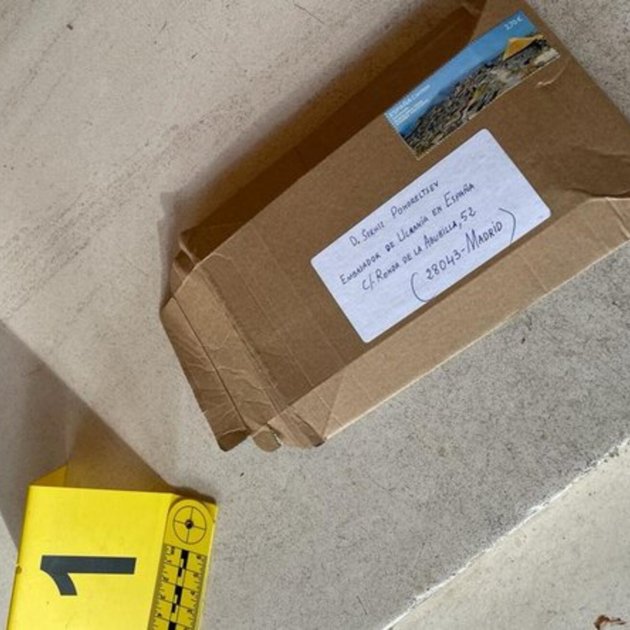Several brown packages containing explosive or pyrotechnic material, detected over the last day in Spain, have generated a lot of public concern and have caused the secretary of state for Security, Rafael Pérez, to hold a press conference to give the details of these postal packets, although he was not able to go much further, as the investigation is ongoing and many details are still unknown or yet to be clarified. The first case detected yesterday was the one that generated most concern, because it was aimed at the Ukrainian ambassador in Spain, and exploded in the hands of an embassy employee, causing a minor injury. Then, another was detected in Zaragoza, which the police detonated, and this morning there was evidence of a third package that had arrived at the military base of Torrejón de Ardoz, near Madrid, from where many of Spain's shipments of material to the Ukraine depart.
Hours later, it was reported that at the end of November a security team had detected a package addressed to Spanish prime minister Pedro Sánchez containing pyrotechnic material, and that this morning another was intercepted addressed to Margarita Robles, the defence minister. All of this has generated public nervousness, but Rafael Pérez called for calm and considered that there is no need to increase the anti-terrorist alert for these events, even though the National Audience is investigating the affair it as if it were terrorism.
Appeal for calm
Now, police are working to see if all of these packages, which were detected within a period of just a few hours, are connected. At the moment, Peréz has reported, the evidence indicates, speaking "with prudence", that they were mailed from inside Spain, and in all five cases they are brown packages. "The material of the five envelopes matches, it is homemade," explained the secretary of state. The Spanish National Police are analyzing them one by one to try to identify further clues and the security head did not want to comment on whether the envelopes contained any message, which he justified by the need to protect the investigation. The only one of these packages that is intact is the one that was sent to Torrejón, and this will allow a more thorough analysis and could help to locate the person responsible for it.
The European Commission has also spoken out on this issue, affirming that the situation at the EU SatCen, the European Union's satellite centre, located in Torrejón de Ardoz, is under control. "We confirm that a suspicious package has been identified. The Centre has applied the relevant protocols to ensure the safety of its staff and the continuity of services. The Spanish authorities were alerted immediately, they safely dismantled the package and have begun an investigation," said an EU foreign affairs spokesperson, Nabila Marsali. Similarly, the questioned interior minister, Fernando Grande-Marlaska, under a cloud over the Melilla issue, explained that because of these episodes security has already been strengthened in public buildings, and he too called for calm.
Russia denies any involvement
As the first letter bomb to be reported was the one that exploded at the Ukrainian embassy, all eyes turned to Russia. Nevertheless, the diplomats representing the Moscow government have issued a short statement in which they make it clear that "any terrorist threat or act, even more so if directed against a diplomatic mission, is fully condemnable", and they deny any responsibility for the attacks.
